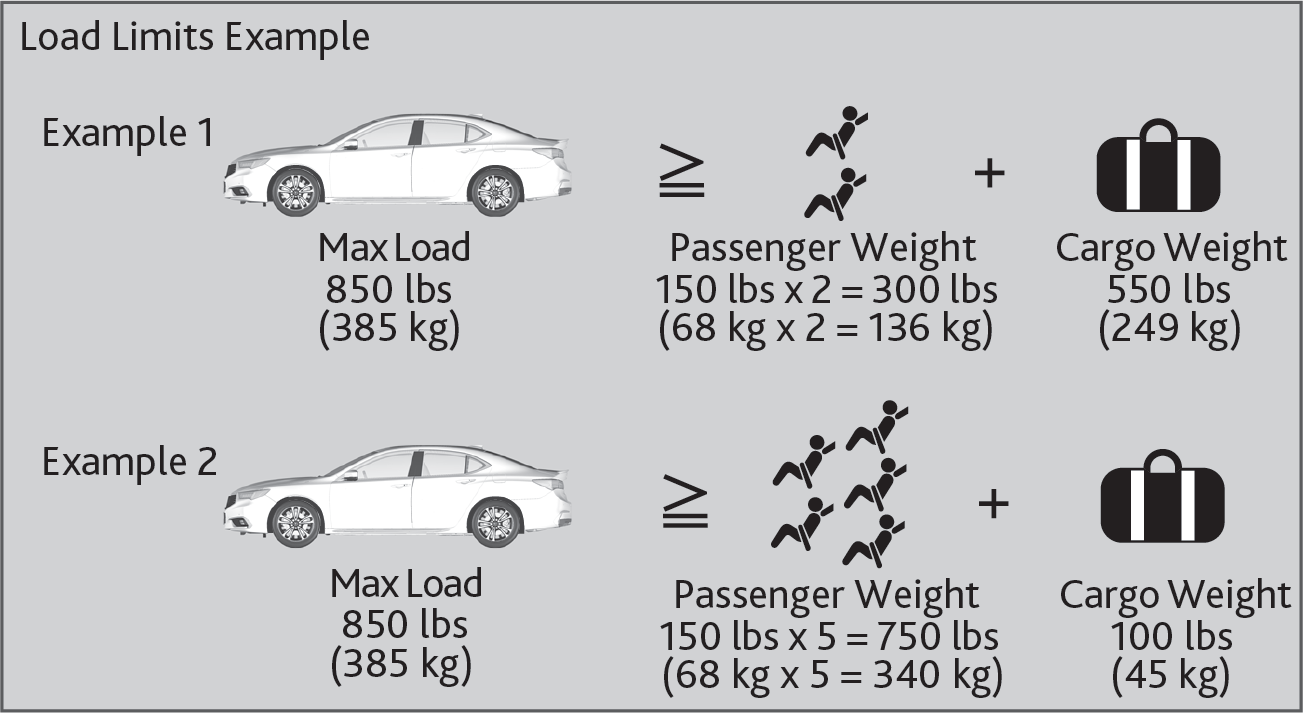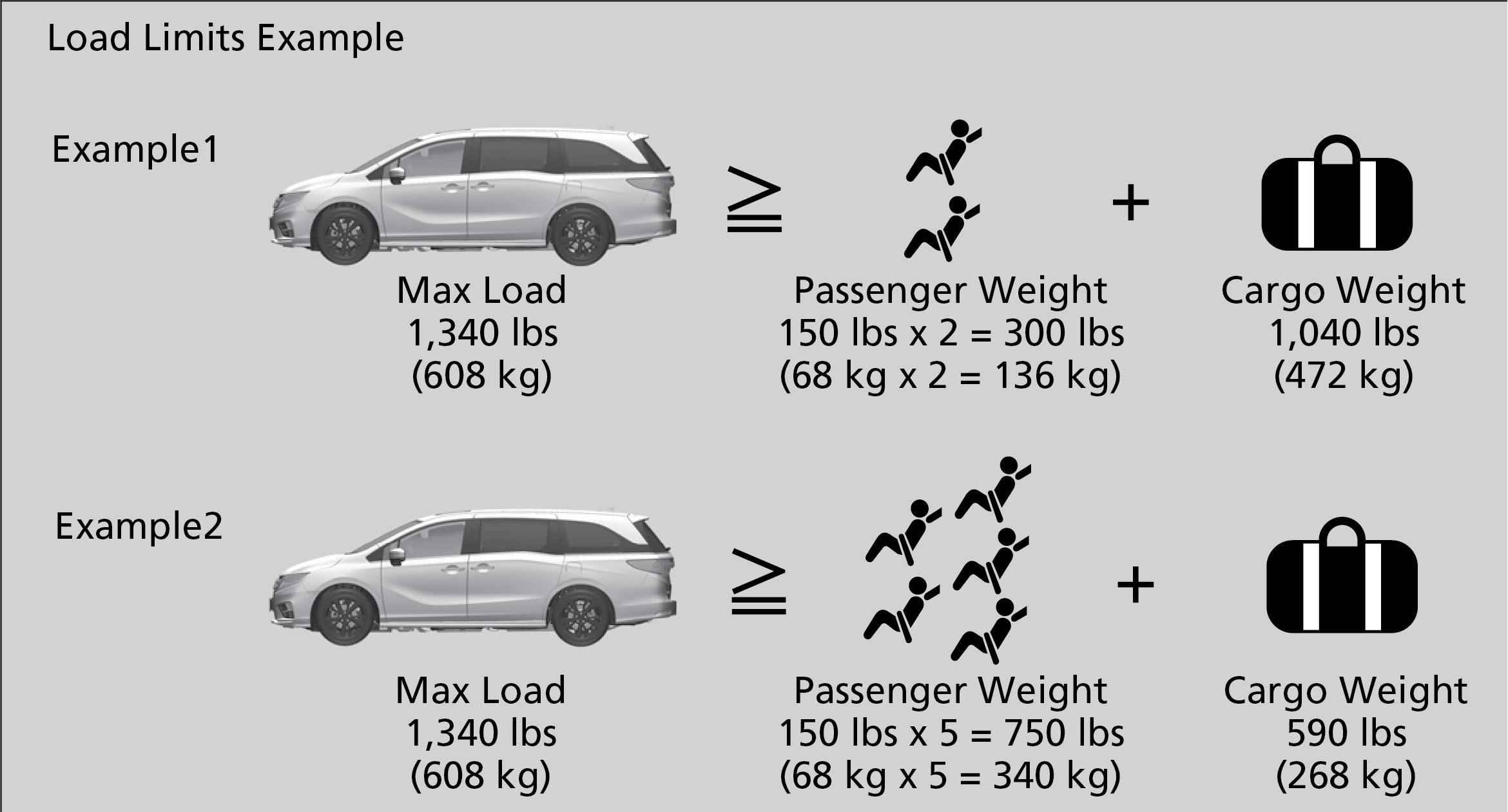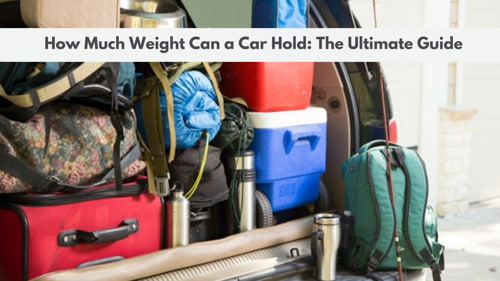How Much Weight Can a Car Hold: The Ultimate Guide
Understanding a car’s weight capacity is crucial for safety and performance. Overloading can lead to tire blowouts, suspension damage, and reduced braking efficiency. Most cars have a Gross Vehicle Weight Rating (GVWR), including the car’s weight and maximum cargo.
This information is usually found on a sticker inside the driver’s door or in the owner’s manual. Knowing this limit helps avoid accidents and costly repairs. Consistently distribute weight evenly and secure heavy items to prevent shifting. Regularly checking tire pressure and vehicle condition can ensure safe driving, especially when carrying heavy loads.

Introduction To Car Weight Capacity
Cars have a weight limit. Knowing this limit is very important. It helps keep you and your car safe. Each car has a different weight limit, set by the car maker. The limit includes people, luggage, and any other items.
Importance Of Knowing Limits
Overloading a car can be very risky. It can cause the car to break down, use more fuel, and be harder to control, making it unsafe to drive. Always check the weight limit in the car’s manual.
Potential Risks Of Overloading
Overloading can damage the car’s tires, leading to tire blowouts. The car’s brakes may not work well, causing accidents. The car’s suspension system can also be damaged. It is very important not to overload the car.

Factors Affecting Car Weight Capacity
Car weight capacity depends on factors like suspension strength, tire load rating, and chassis design. Proper weight distribution also influences a vehicle’s load-bearing ability. Always refer to the manufacturer’s guidelines for accurate information.
Type Of Vehicle
Different cars have different weight limits. SUVs usually hold more weight than sedans, trucks can carry the most weight, and small cars, like compact cars, hold less weight. Always check your vehicle’s manual. It will tell you the exact weight limit.
Manufacturing Specifications
Each car has unique specifications, including the gross vehicle weight rating (GVWR). GVWR is the maximum weight your car can carry, including the car’s weight, passengers, and cargo. Never exceed this limit. Exceeding the limit can damage your car and be dangerous.
Understanding Gross Vehicle Weight Rating (gvwr)
GVWR stands for Gross Vehicle Weight Rating. It is the maximum weight a car can safely carry, including the car’s own weight, passengers, and cargo. Overloading a car can cause serious damage and be dangerous for the driver and others on the road.
The GVWR is usually on a sticker inside the driver’s door or in the car’s manual. If you cannot find it, ask your car dealer. Knowing the GVWR helps you avoid overloading your vehicle.

Payload Capacity Explained
Understanding a car’s payload capacity is crucial for safety and performance. This measurement determines the maximum weight a vehicle can safely carry, including passengers and cargo. Always check the vehicle’s manual for specific limits.
Difference Between Gvwr And Payload
GVWR stands for Gross Vehicle Weight Rating. It is the maximum weight a car can safely carry. This includes the car’s own weight, passengers, and cargo. Payload is different. It refers to the weight of the cargo and passengers only. Knowing the difference is important for safety.
Calculating Payload Capacity
First, find your car’s GVWR. It is usually on a label inside the car door. Next, find the curb weight of the car. This is the weight of the car with no cargo or passengers. Subtract the curb weight from the GVWR. The result is the payload capacity. This is how much weight you can add to the car safely.
Impact Of Overloading On Vehicle Performance
Overloading a car can be very dangerous. The car may not stop quickly, causing accidents. It may also become hard to control, making it unsafe for everyone. The extra weight can also cause tires to burst, leading to crashes. Keeping the car light is the best choice.
Extra weight harms the car’s parts. The engine works harder, which can cause it to break sooner. The brakes wear out faster, and they may fail when needed most. The suspension also gets damaged, making rides bumpy and uncomfortable. Overloading costs more in repairs, so it is better to avoid it.
Tips For Distributing Weight
Distribute weight evenly to prevent overloading your car. Check the owner’s manual for the vehicle’s maximum load capacity. Avoid placing heavy items on one side.
Proper Loading Techniques
Place heavy items on the floor. Keep them as low as possible. Distribute weight evenly on both sides. Avoid overloading one side. Balance the weight between the front and rear. Use the trunk for heavier items. This helps keep the car stable.
Use Of Cargo Management Tools
Use cargo nets to secure items. They prevent things from shifting. Cargo organizers keep items in place. Roof racks help carry extra luggage. Ensure they are properly installed. Bungee cords are handy. Use them to tie down loose items. They keep your load secure.
Legal Implications Of Overloading
Overloading a car can lead to severe legal consequences, including fines and penalties. Ensuring a vehicle’s weight limit is not exceeded helps avoid accidents and enhances road safety.
Traffic Laws And Regulations
Cars have a maximum weight limit for safety. Overloading can lead to fines and penalties. Each car has a Gross Vehicle Weight Rating (GVWR), which is set by the manufacturer. Exceeding the GVWR is illegal. It is important to check this rating before loading your car.
Penalties For Overloading
Driving an overloaded car is dangerous. Penalties can be severe. You might get a ticket or points on your license. In some places, you could face court. Fines may be expensive. Always follow weight limits to avoid trouble.
Maintaining Optimal Performance
Regular maintenance checks keep your car in good shape. Oil changes are important. Check your brakes often. Make sure your suspension is strong. Look at your car’s manual for guidance. Inspect the tires for wear and tear. Clean the air filters regularly.
Choose the right tires for your car. Load-appropriate tires can carry more weight. Check the tire’s load rating. Inflate the tires to the correct pressure. Never overload your car. This can cause tire damage. Always follow the manufacturer’s recommendations.
Frequently Asked Questions
How Much Weight Can A Typical Car Hold?
A typical car can hold around 800-1,200 pounds, including passengers and cargo.
Does Car Weight Capacity Include Passengers?
Yes, the car’s weight capacity includes the total weight of passengers and cargo combined.
What Happens If You Exceed Car Weight Limit?
Exceeding the weight limit can damage suspension, brakes, and tires, and may also affect handling.
How Do I Find My Car’s Weight Capacity?
Check the owner’s manual or the sticker on the driver’s door for the vehicle’s maximum weight capacity.
Can Too Much Weight Affect Fuel Efficiency?
Yes, carrying excess weight reduces fuel efficiency by making the engine work harder.
Does Car Weight Capacity Affect Safety?
Yes, exceeding weight limits can compromise vehicle safety, affecting braking and handling performance.
How To Distribute Weight In A Car?
Distribute weight evenly, keeping heavier items low and centered to maintain vehicle balance and stability.
Conclusion
Understanding how much weight a car can hold ensures safety and optimal performance. Always check your vehicle’s manual for accurate information. Overloading can lead to serious issues. Regular maintenance and mindful loading can prolong your car’s lifespan. Prioritize safety and efficiency for a smooth driving experience.







